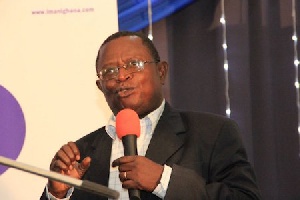 Senior Research Fellow at IDEG, Dr Kwesi Jonah
Senior Research Fellow at IDEG, Dr Kwesi Jonah
The Institute for Democratic Governance (IDEG) has urged the Government to address the challenges facing the local governance system towards improving civic participation and social accountability of the decentralisation process.
The Institute said challenges such as delays in disbursement of funds to district assemblies, low internal revenue generation and over reliance on government coffers abounded in the local governance system.
The issues were raised by a delegation from IDEG, who visited the Ministry of Local Government and Rural Development (MLGRD) on Monday, to share their findings from a project dubbed, “Strengthening Civic Participation and Social Accountability in Local Government,” which was carried out in the Shama, Prestea-Huni Valley and Tarkwa-Nsuaem districts of the Western Region.
The project to enhance local governance was started in May 2014 under Ghana’s Local Governance and Decentralisation Programme (LOGODEP), with support from the United States Agency for International Development (USAID).
The IDEG delegation explained that delays in disbursement of funds such as the District Assemblies Common Fund, had often stalled projects in the Health, Economic and Education sectors, hampered monitoring of project implementation and caused cost over-runs.
IDEG recommended that the Assemblies should invest the stipulated percentage of the common fund for persons with disabilities to generate sustainable income instead of paying it to them as stipends.
The Institute said it found out that disseminating information to assembly members was done on partisan basis.
“Assembly members, who are either members or closely associated with the ruling party, get quality information whereas the other members are denied the same information,” Dr Kwesi Jonah, a Senior Research Fellow at IDEG explained.
“If all assembly members are going to be able to participate in the work of the assembly effectively, there should be information sharing on an equal basis regardless of which party you are suspected to belong to”.
According to IDEG, the project had improved trust between assemblies and civil society organisations and had improved the latter’s capacity to advocate and influence the priorities of local government and monitor the implementation of the assemblies’ action plans.
The Social Accountability Unit of the MLGRD welcomed the suggestions, which they said, were in line with the Ministry’s efforts at improving citizens’ understanding and participation in public financial management.